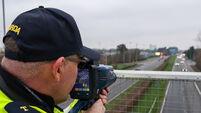'I thought nobody would ever believe me' - Kathleen Correia

Kathleen Correia speaks to the media outside the Criminal Courts of Justice in Dublin, where her husband Sergio Correia was sentenced to eight years in jail after he was found guilty of corercive control. Picture: Collins Photos
A brave and inspirational Enniscrone woman survived years of horrific abuse at the hands of her husband, who was jailed last week.
Kathleen Correia waived her anonymity to allow her rapist and abuser to be named.
Sergio Correia, aged 48, was jailed for eight years for rape and coercive control.
“Waiving my anonymity has 100% empowered me," Kathleen told the at the weekend. "It’s still all a bit overwhelming but I just wanted to be able to tell my story. If I had heard a story like this years ago it would have resonated with me and made me stop and think, 'God, this is what’s happening in my house'. It would have given me hope and encouraged me to speak to somebody.
“Because I have waived my anonymity, I can explain how it happened and how nobody would have thought this was happening. I hope this can help somebody in a similar situation.
“I don’t want to carry this anymore. I felt like I was wearing a cloak and shielding it from everybody. I just had to pretend. I don’t have to pretend now. I can be my own self again and I don’t have to feel ashamed or embarrassed. I definitely feel that a weight has been lifted off me,” said the mother-of-three.
Kathleen, now aged 41, first met her future husband through a friend while holidaying in his native Portugal in 2006. When he moved to Ireland their relationship became romantic.
“I was so happy when I got married. I was so happy when we met. He was such a nice guy and so easy to talk to, and we had so much in common. I thought 'I’m so lucky, I have met a nice man, I have a nice home, and the family I always wanted'.”
But following their marriage in 2012, Kathleen noticed a change in her husband. She had left her job to focus on raising the two young children they had at the time and his role as the breadwinner coincided with an unreasonable demand for sex.
“The whole time you’re thinking, ‘Is there something wrong with me?’ You are at home and you’re minding kids. At the time I wasn’t working, and you are kind of isolated. You start to lose a bit of your confidence and when your husband is telling you you’re not good enough, you start to think that you’re not,” said Kathleen, who now works in Human Resources.
Her husband would demand sex five times a week with Kathleen’s feelings never coming into it.
“It had to happen x times a week, when he said it, and the way he wanted it. I tried to tell him for years that’s not normal, in a calm and nice way, and the impact his behaviour was having on me and how I didn’t want to live like this.
“It didn’t matter if I was sick or what was happening at home. He had to get what he wanted. If there was a night where ‘I got away with it,’ as he would tell me, he would say ‘Well you got away with last night, you won’t get away tonight’. I would spend the whole day dreading what’s going to happen or what am I going to have to do. I was living in constant fear of his demands and expectations.
“It didn’t matter if I said no because no didn’t mean no.
“He was so entitled. He was my husband; these were his demands and once or twice a week wasn’t going to cut it. He would tell me if he didn’t get what he wanted he would pack his bags and leave. I didn’t want him to leave but I didn’t want to live like that either. I was afraid because we had a mortgage, and I wouldn’t be able to manage on my own. I was trapped in the marriage because I didn’t know what to do and hadn’t told anyone.
“He had a very twisted view of what a wife was. I was treated like an object.”
Correia worked in bars and restaurants around the Ballina area for many years.
“So many people in Ballina thought, ‘Jesus, he’s great,’ and he knew more people in the town than I did. He was a very likeable person. That actually made it very hard for me because everywhere we went people really liked him and I thought nobody would ever believe me. Everybody knows him and thinks he’s wonderful,” said Kathleen.
Her husband’s behaviour grew ever more extreme and abusive.
“2019 was the worst year and things had really escalated so badly. I tried to assert myself with him and hold on the ‘No, it’s not happening', but he would get so angry, and I would get so afraid of him. I’d have no choice, and I would have to give in,” said Kathleen.
In an effort to aid their troubled marriage, Kathleen organised a surprise trip to Dublin to see Pearl Jam frontman Eddie Vedder in concert.
In a healthy relationship, this would have been something a couple could have looked forward to together. Instead, Kathleen was once again filled with dread as Correia greeted the news about the concert with the chilling line, ‘That’s great, I’ll get anal that night.’ That night after the concert, Correia anally raped his wife in the Gibson Hotel. She begged and pleaded with him not to, but he forced her, saying it was his 'birthday treat'.
“At the time the rape happened in 2019, I knew it was something that was really bad that was after happening. But in my mind did I say, ‘My husband has just raped me.’ No. I knew I felt so bad and he hurt me physically and emotionally but I couldn’t get my head around it. It was only when I told a friend, she said to me, ‘That was rape. He can’t do that. It doesn’t matter if you’re married.”
She believes her husband never thought he would face the consequences of his vile actions.
“I was a very quiet and placid person. I really hate confrontation. I think he never thought I would stand up to him. Anytime I raised the way he was behaving at home or his demands for sex all the time and try and tell him this is not normal, he would say to me, ‘Well you came from a broken home and you’d never want that so we will never split up.’ He used that against me.“
Sergio Correia had also been concealing a drug addiction from his wife.
“He was so dishonest and lied for years. We were struggling financially, and I didn’t know he was spending that money on drugs.”
A month after the Dublin rape, the extent of his drug addiction unravelled and he later entered a residential rehab programme.
“I told him 'I will support you all through that, but we have a far bigger problem in your marriage that has affected me far more than your drugs."
Kathleen was with her husband when he was being assessed for the centre which he entered one month later.
“At the assessment, the counsellor told him his wife could be there on a Wednesday for family day and there would be group talks about addiction and how it impacts the family and how it causes so much trauma and problems for families. And Sergio turned around and said, ‘Oh right, if my wife is going to be here from 10 until 4 every Wednesday, where can we go to have sex?’
“Her face nearly dropped, and I was so embarrassed and was afraid that she thought I was like this too. I was so ashamed and apologised to the counsellor and told her this was a huge problem in our marriage. What he expects from me in the marriage is not acceptable and not normal. I told her about his demands for ‘treats’ and what happened in the Gibson Hotel.”
The following month, Correia returned home but nothing had changed despite his behaviour being addressed during his in-patient treatment. Kathleen admits she felt let down that the centre failed to see the danger she was in.
“I was his wife, and he wasn’t going to be told what he could and couldn’t do to me.”
There were times when she was forced to fight her husband off and by early 2020 she had managed to get him to move out.
When the Covid-19 pandemic hit, Kathleen allowed Correia back into a separate bedroom in the house so he could see their children. He would continue to intimidate her and try to pester her into sex.
As a coping mechanism, Kathleen began to over-exercise and her relationship with food changed. It was a visit to counsellor David O’Farrell to address these issues that proved to be another turning point for Kathleen. She told him about her husband’s behaviour and the rapes.
“The man nearly collapsed. I told him my husband had moved out of the house now. It had taken months to get him out, but he wants to move back in and get couples counselling and fix the marriage. David told me the marriage was over. He’s an abusive man who has raped you in your marriage for years. You need to get a legal separation from that man as quickly as you can. This is coercive control, and he will escalate."
Kathleen went to gardaí in April 2021 and says she can “never thank them enough” for their help and support, adding she will be forever indebted to the officers from the Divisional Protective Services Unit, the Rape Crisis Centre, Victim Assistance, her counsellor, her employer and her family and friends.
“Without all these people, would I have made it? I don’t know.”
Correia denied all charges so Kathleen faced an arduous trial that took a considerable toll.
“It was something I was dreading for so long. He was charged back in 2022. When the family liaison officer told me the court case was going to be in 2024, I was so upset. I thought to myself how am I going to have this over for me for the next two years? Part of me hoped he might plead guilty and save me an awful ordeal, but he didn’t.”
The trial took place in May during a sitting of the Central Criminal Court in Castlebar.
“Every time I go to Castlebar now, that’s what I associate it with. I used to drive past the courthouse and it meant nothing to me, now it means a lot.
“The trial itself was so intense. I didn’t have anyone in the court with me, I didn’t want anyone listening to the details. I had my family liaison officer with me all the time and he was a great support.
“I didn’t even take it every day at a time. I was trying to survive from 10am until 1pm and if I could do that, I could get myself together and go back at 2pm again. After every day I would tell myself you will never have to go through that day again. It was horrendous.”
Kathleen had to take the stand for a gruelling four days.
“My evidence was the hardest part, and it felt like forever. By the fourth day, I was at breaking point, I had literally nothing left to give.
“I had to bring myself right back to the nights and I was reliving the rapes all over again. I felt like it all just happened to me again with everyone there watching me. I just felt exposed and had to tell myself over and over again not to get sick.
“You do feel ashamed because you’re in a courtroom full of strangers and it’s your own body. You’re talking about your husband who you loved and who you thought loved you. In effect, you’re a witness to a crime that was committed against you and your body is the crime scene. It was very traumatic.
“It was so hard, and you don’t want to put other people off coming forward. Would I change my mind now and not put myself through it? Absolutely not. Because no matter what, I stood up for myself. I’m so grateful I got justice.”
Kathleen said Correia showed no hint of remorse or regret.
“That’s very hard, He wrote a letter of apology but that was only on the advice of his legal team.
"There is no point in saying sorry to me now. The damage was done years ago. Even his letter of apology was all about him really and it was the life choices he made in relation to drugs that made him do what he did. He was blaming drugs for raping his wife and looking for forgiveness. That’s basically what his letter of apology was. That’s not remorseful. There was no acknowledgement of the pain and the turmoil he caused and how he has totally destroyed my life.”
Kathleen has been greeted with compassion and love in her home place since Correia’s crimes were revealed.
“I’ve had so many nice messages. Enniscrone is a very small place and people have known me there since I was in school. They just can’t believe what happened.”
Her heart has been warmed by small but caring gestures like the local shopkeeper who gave her son a box of chocolates for his Mum or the Ballina pharmacy, the local church choir, and women from a domestic abuse group who had bouquets of flowers delivered.
“Those little things are so lovely. There has been so much positivity and kindness and that has really helped me,” said Kathleen.
She knows she still has a long road ahead but sees herself as a survivor.
“I still have a lot of healing to do but I have got this far, and I know I will. You can heal and I will heal.”




